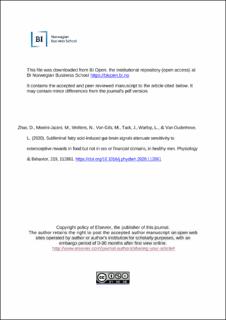Subliminal fatty acid-induced gut-brain signals attenuate sensitivity to exteroceptive rewards in food but not in sex or financial domains, in healthy men
Zhao, Dongxing; Moeini-Jazani, Mehrad; Weltens, Nathalie; van gils, michelle; Tack, Jan; Warlop, Luk; Van Oudenhove, Lukas
Journal article, Peer reviewed
Accepted version
Permanent lenke
https://hdl.handle.net/11250/2648226Utgivelsesdato
2020Metadata
Vis full innførselSamlinger
- Publikasjoner fra CRIStin - BI [1015]
- Scientific articles [2181]
Sammendrag
Background: Reward sensitivity can generalize across domains, but evidence for generalization of suppressive reward-related stimulation is sparse, especially in the context of interoceptive nutrient-related stimuli. We hypothesized that subliminal fatty acid-induced gut-brain signals could attenuate sensitivity to exteroceptive rewards, not only within the food domain but also across domains. Method: Intragastric infusion of 2.5g lauric acid (fat condition) or saline (saline condition) was administered to 59 healthy heterosexual male volunteers in a blinded fashion. To assess whether the resulting interoceptive signals attenuate reward sensitivity within the food domain, participants rated the palatability of food images and performed a progressive ratio task. To assess whether such attenuation effect generalizes to the sexual and financial reward domains, participants rated attractiveness of female face images and performed an intertemporal monetary choice task. Results: Participants’ ratings of food images were lower (F1,172 = 4.51, p=0.035, Cohen's d: -0.20) in the fat condition. The progressive ratio task terminated earlier in the fat condition compared to saline (F1,52 = 4.17, p=0.046, odds ratio = 0.31, 95%CI [0.11, 0.98]). Participants’ ratings of female face images did not differ between conditions (F1,172 = 1.85, p = 0.19, Cohen's d: -0.15). Moreover, the monetary discounting rate did not differ significantly between conditions. Conclusion: Overall, these findings suggest a domain-specific effect of subliminal fatty acid infusion on decreasing reward sensitivity.

